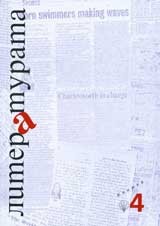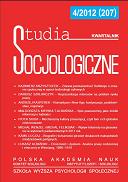












Keywords: identity; gender; politics; political youth organization
The article discusses the results of the qualitative research conducted in 2010 among female members of political youth organizations from Malopolska region. The case study embraces representatives of the organizations of various ideological orientations. The research project was based on fifteen in-depth biographical interviews and the use of Polish adaptation of Bem Sex Role Inventory. The results of the research indicate that, in accordance with the adopted hypothesis, the identity of female youth activists exhibit certain elements, which have traditionally been referred to as masculine.
More...
Keywords: economic sociology; industrial relations; interest representation; infl uence production process; neopluralism
The article prompts to debate on research of the phenomena related to interest representation in the Polish labour market. The first part gathers and puts in order the necessary information on the concept of interest representation, models of systems of interest representation, as well as theoretical approaches used to study this phenomenon in Poland and worldwide. The second part presents the main features of the contemporary system of interest representation in Poland, while locating it in the institutional environment of labour market. Certain phenomena referred to in this part of the text induce us, in the author’s opinion, to inquire into the state of the system of interest representation in Poland. The third part of the article offers some research questions posed from the so-called “neopluralist perspective”, which can be treated as a research tool which makes it easier to conceptualize the study on systems of interest representation and indicates an attractive research direction.
More...
Keywords: sociology of the Internet; digital divide; politics; democracy; elections
In the information society, the digital divide may result in political exclusion, while the access to new technologies may reinforce civic activity. The purpose of the article is determining whether political presence on the Internet (defined as both conscious and unconscious contact with online political content) has any influence on voting independent of socio-demographic factors influencing both voting and Internet use. The analysis was conducted on data from survey conducted by CBOS Public Opinion Research Centre after 2011 parliamentary elections on N=969 respondents representative for adult population of Poland. Statistical analysis revealed that there is independent effect of political activity on the Internet on voting behavior. However, the hypothesis about unconscious effect of Internet on voting was rejected.
More...
Keywords: Review Essay
a review of Inhabiting in the Conditions of Migration (review of: Niedom. Socjologiczna monografia mieszkań migracyjnych [A Non-Home. Sociological Monograph of Migration Appartments] by Magdalena Łukasiuk and Marcin Jewdokimow)
More...
Keywords: sociology of religion; New Age; Romanticism; underground culture; esoterism
What the article explores is the presence in New Age of ideas central for romanticism: the ideas of organicism, imagination, and temporalism. The author treats their presence in Romanticism as continuation and reinterpretation of ideas characteristic of Western esoterism. Yet, New Age is defined as a continuation of the esoteric tradition subjected to a Romantic reinterpretation and, at the same time, as a response to the criticism of the disenchanted modern civilization. Although New Age takes many different forms (low and high New Age), the source from which it originates are the ideas analyzed in the article. The themes of self-fulfillment, self-cognition, originality, or self-expression, typical for New Age, have Romantic roots and relate to the three analyzed core ideas.
More...
Keywords: discourse; ethnicity; written discourse analysis
The article presents an example of ethnic discourse analysis of the press published in Winnipeg (Canada) between 1896 and 1919. The presented research strategy is based on qualitative analysis of English, German, and Polish newspapers. The perspective of discourse analysis offers some possibilities to conduct research on creating the definition of ethnic identity on the pages of ethnic newspapers by the symbolic elite, changes within one ethnic group as well as discourse struggle for social meaning between competing groups. The sociological perspective of discourse analysis focuses particularly on social inequalities and on ideologies which legitimate such inequalities.
More...
Keywords: social demography; population census; National Census of Population and Housing 2011 (NSP 2011); population
The article discusses major features of censuses, focusing particularly on the recent census of the population of Poland (National Census of Population and Housing 2011, NSP 2011). Description of the census is preceded by a general historical background and by a presentation of the context created by recommendations concerning population censuses provided by international bodies, as well as experiences and practices implemented by various countries. Usefulness of census data on population is analyzed, as well as their advantages and disadvantages and prospects for the future. While the first part of the article discussing the characteristics of the NSP 2011 focuses on the official assumptions underlying the census, adopted methodology, etc., the second part attempts at a critical assessment of these assumptions and of the quality of census data.
More...![Europeans by Their Own Choice (review of: Tożsamość, zaufanie, integracja – Polska i Europa [Identity, Trust, Integration – Poland and Europe] by Włod](/api/image/getissuecoverimage?id=picture_2012_19886.jpg)
Keywords: Book review
a review of Europeans by Their Own Choice (review of: Tożsamość, zaufanie, integracja – Polska i Europa [Identity, Trust, Integration – Poland and Europe] by Włodzimierz Wesołowski and Kazimierz M. Słomczyński eds.)
More...
Keywords: social change; networks; Internet; sociological theories; modernization; crisis
The article focuses on processes of change brought about by the digital technologies. The social change caused by them is frequently being explained by reference to new paradigms, notably theories of information and network society. In the Author’s view limiting the explanation to these theories or even mainly concentrating on them is a weakness of the newest theories referring to change, transformation, social development etc. The Author attempts to answer the question which of the older theoretical orientations dating from before the emergence of the information and network society do not contribute anything at all or very little to our understanding of change and which ones are from this point of view still applicable and useful.
More...